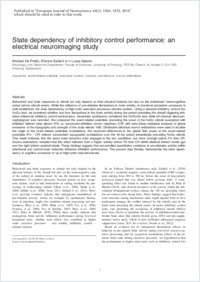State dependency of inhibitory control performance: an electrical neuroimaging study
- De Pretto, Michael Neurology Unit, Medicine Department, Faculty of Sciences, University of Fribourg, Switzerland
- Sallard, Etienne Neurology Unit, Medicine Department, Faculty of Sciences, University of Fribourg, Switzerland
- Spierer, Lucas Neurology Unit, Medicine Department, Faculty of Sciences, University of Fribourg, Switzerland
-
01.07.2016
Published in:
- European Journal of Neuroscience. - 2016, vol. 44, no. 2, p. 1826–1832
English
Behavioral and brain responses to stimuli not only depend on their physical features but also on the individuals' neurocognitive states before stimuli onsets. While the influence of pre-stimulus fluctuations in brain activity on low-level perceptive processes is well established, the state dependency of high-order executive processes remains unclear. Using a classical inhibitory control Go/NoGo task, we examined whether and how fluctuations in the brain activity during the period preceding the stimuli triggering inhibition influenced inhibitory control performance. Seventeen participants completed the Go/NoGo task while 64-channel electroencephalogram was recorded. We compared the event-related potentials preceding the onset of the NoGo stimuli associated with inhibition failures false alarms (FA) vs. successful inhibition correct rejections (CR) with data-driven statistical analyses of global measures of the topography and strength of the scalp electric field. Distributed electrical source estimations were used to localize the origin of the event-related potentials modulations. We observed differences in the global field power of the event-related potentials (FA > CR) without concomitant topographic modulations over the 40 ms period immediately preceding NoGo stimuli. This result indicates that the same brain networks were engaged in the two conditions, but more strongly before FA than CR. Source estimations revealed that this effect followed from a higher activity before FA than CR within bilateral inferior frontal gyri and the right inferior parietal lobule. These findings suggest that uncontrolled quantitative variations in pre-stimulus activity within attentional and control brain networks influence inhibition performance. The present data thereby demonstrate the state dependency of cognitive processes of up to high- order executive levels.
- Faculty
- Faculté des sciences et de médecine
- Department
- Médecine 3ème année
- Language
-
- English
- Classification
- Biological sciences
- License
-
License undefined
- Identifiers
-
- RERO DOC 277705
- DOI 10.1111/ejn.13265
- Persistent URL
- https://folia.unifr.ch/unifr/documents/305182
Statistics
Document views: 104
File downloads:
- pdf: 247
